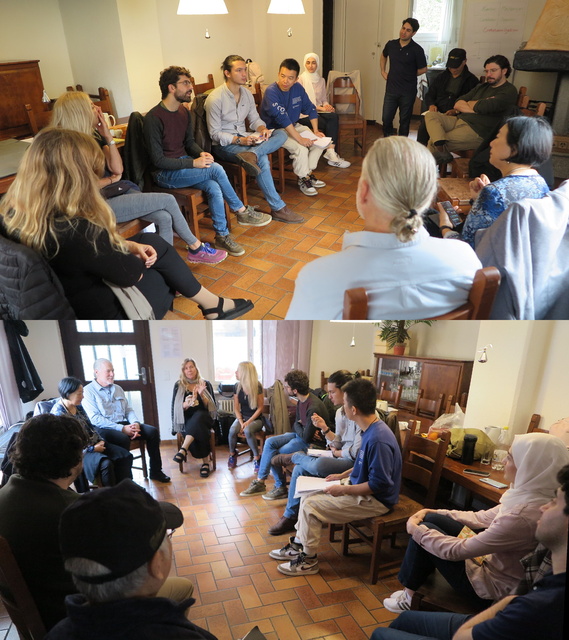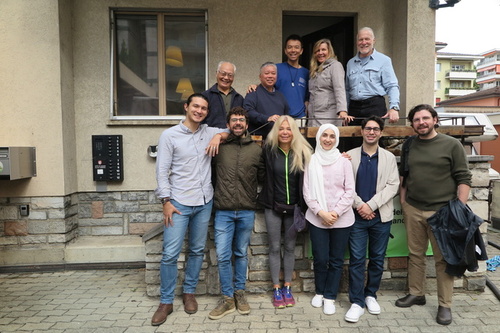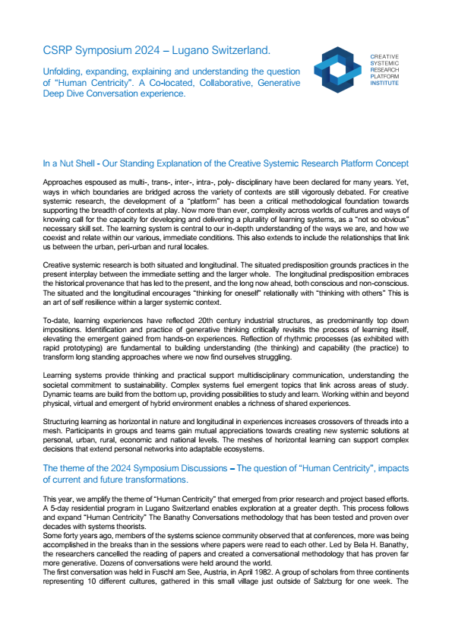For five immersive days, a team of six researchers had the opporunity to collaborate on ideas on rhythmic shifts (mostly based on Systems Changes Learning) and anticipatory systems (in the legacy of Robert Rosen). The 2024 Banathy Conversation was organized by the Creative Systemic Research Platform Institute, facilitated by Susu Nousala, Gary S. Metcalf, and Jelena Sucic.
Converrsatons had been convened by the International Federation for Systems Research since 1982.
Conversations were introduced by Bela H. Banathy around 1980 as an alternative to the classical conferences which usually consist only of presentation of streamlined papers and short question slots. In a Conversation a small group of scientists meets for several days to discuss in a self-guided way a topic of scientific and social importance. A Conversation is preceded by an intensive preparation phase and followed by a post-conversation consolidation period. No papers are presented during the conversation; the participants discuss face-to-face their topic, often modifying it in the course of the conversation.
As far as we know, this was the first event following the Banathy Conversation Methdology since the IFSR 2018 Conversation.
The Banathy approach has been a highlight experience in my personal development. I was fortunate to have been invited to Austria to attend IFSR Conversation events in 2004, 2006, 2008, 2010, and 2012, Moving on from an era when email messaging was the most common medium, I spent a month this past summer updating online communications technologies to pilot mobile devices, secure group chat, a wiki, and a classroom platform.
On the first day, Gary started the plenary session with the traditional empty chair that Bela Banathy included, to recognize constituents who aren’t privileged to attend such meeting. We had two Conversation teams.
Team Brown was composed of residential participants who had flown in for the meeting:
- David Mallery, from Scotland’s Rural College in Edinburgh;
- Zaid Khan and Samah Kamalmaz, from the Systems Changes Learning Circle in Toronto;
- Jian Chen, from Tongji University College of Design and innovation in Shanghai;
- Timothée Landa, from Conservatoire National des Arts et Métiers in Paris;
- and, myself!
Judith Rosen was scheduled to be part of our team, but unfortunately had a family issue arise in the week right before travelling.
The second team, named Confluenza, was composed of creatives local to the Ticino canton. In an adjacent space, they formalized an association that have previously been more casual. That team worked in a more fluid maner, with a core group maintaining coherence as parricipants threaded attendance according to personal availability.
For visitors to Switzerland, the discussion days were full. We grabbed opportunities to tour around Lugano on some lunchtimes and late afternoons before the sun set.
On morning of the fifth day, the two teams convened to reflect on progress that was had been made during the week.
We shared learning not just within each team, but also across both teams. Formal reports will follow in a few months, as Conversation Experience Reports are co-authored.
The conventing in Lugano was closed out with the Annual General Meeting for the CSRP Institute, in the fourth year after incorporation in Switzerland.
Systems researchers may look forward to more Banathy Conversation events to come from CSRP Institute. Loose plans have been discussed for a Conversation in the USA in April 2025, and in Southeast Asia in September-October 2025.







